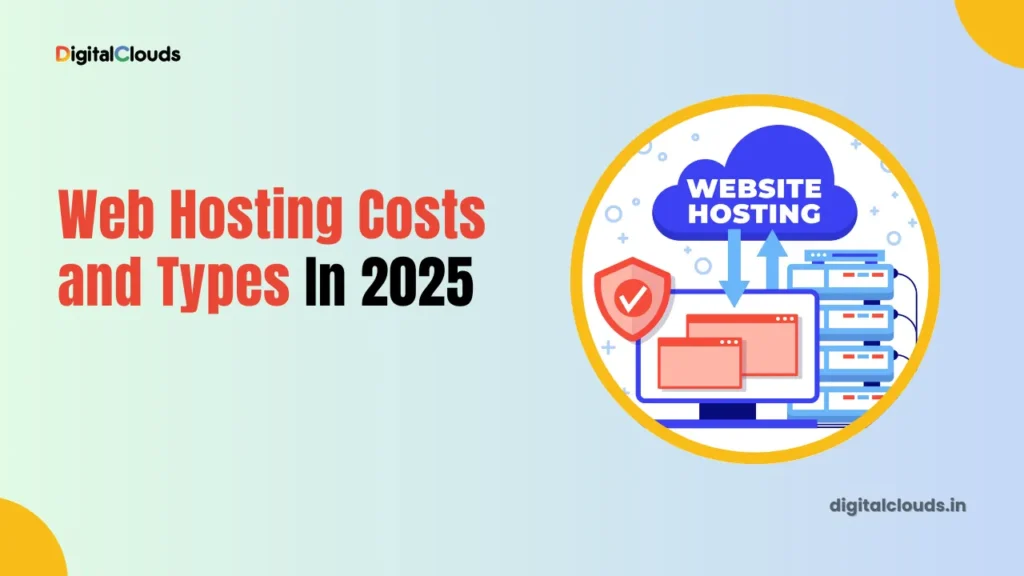As of 2025, selecting the right hosting service is crucial for anyone building a strong online presence. Your choice of hosting directly impacts your site’s speed, security, and ability to handle traffic. While shared hosting plans may seem budget-friendly, the actual Web Hosting Cost can vary greatly depending on your requirements and chosen features.
With advancements like cloud hosting, powerful CDNs, and enhanced security, hosting expenses have evolved, affecting Website Development Costs as well.
In this guide, we break down Web Hosting Costs and explore different types of hosting available in 2025. By understanding these details, you can make smarter budget decisions and keep your website performing at its best.
What is Web Hosting?

Web hosting is a service that allows individuals and businesses to publish their websites online by storing their website files on powerful, always-connected servers. When someone types your domain name into their browser, the web hosting provider delivers your website content to them instantly.
A reliable web hosting service ensures your website loads quickly, remains accessible without interruptions, and provides secure browsing experiences for visitors. Choosing a trusted host helps protect data, improve search rankings, and enhance user satisfaction. Additionally, it allows website owners to focus on growing their business while the technical maintenance and server management are handled professionally.
What Are The Types of Web Hosting?
Choosing the right hosting type impacts performance, security, and your Web Hosting Cost. Each type offers different features, pros, and cons to match various business and technical needs.
Shared Hosting
Shared hosting is a popular choice for beginners and small businesses looking to keep their Web Hosting costs low. With this hosting, multiple websites share the same physical server resources, making it affordable but sometimes less reliable if other sites overuse resources.
Key Features:
- Low cost and budget-friendly for beginners
- Very easy setup with minimal technical effort
- Basic security included to protect shared accounts
- Limited resources shared among multiple websites
- Shared IP address included in most packages
- Provider handles maintenance and server updates
Pros:
- Most affordable hosting option available today
- User-friendly setup perfect for new owners
- Provider manages all server maintenance tasks
- Includes support and essential website tools
- Good choice for blogs and small sites
- Can easily upgrade to higher plans later
Cons:
- Limited server resources shared with others
- Performance affected by other neighboring sites
- Lower security due to shared environment
- Less control over configurations and resources
VPS Hosting
VPS hosting offers a middle ground between shared and dedicated servers, giving you your own virtual section of a physical server. It delivers better performance, improved security, and more customization while still keeping your Web Hosting Cost reasonable.
Key Features:
- Dedicated resources allocated to your virtual server
- Root access for advanced configurations and control
- Improved security compared to shared hosting plans
- Scalable to handle growing or spiking traffic
- Customizable environment for various application needs
- More stable performance than shared hosting offers
Pros:
- Better performance and speed than shared
- More control over server settings overall
- Easily scalable to match growing businesses
- Enhanced security and privacy for websites
- Suitable for medium or expanding businesses
- Cost-effective compared to dedicated hosting plans
Cons:
- Higher cost compared to shared hosting
- Requires technical skills to manage properly
- Still shares physical server hardware resources
- Can have resource contention during heavy loads
Dedicated Hosting
Dedicated hosting provides you with an entire physical server solely for your website, allowing full control and maximum performance. It’s ideal for large businesses or websites with high traffic, despite the higher Web Hosting Cost involved.
Key Features:
- Full server control with unrestricted customization options
- Highest level of performance for any website
- Maximum security for data and transactions
- Customizable hardware specifications to match needs
- No resource sharing with other websites ever
- Ability to host multiple heavy applications easily
Pros:
- Best possible performance and page speeds
- Complete flexibility and full customization allowed
- Strongest security and ultimate data privacy
- Can easily handle very high traffic loads
- Full control over all software configurations
- Perfect for mission-critical business applications
Cons:
- Most expensive hosting type available today
- Requires expert-level technical knowledge management
- Overkill for small or new websites often
- Longer setup and configuration time needed
Cloud Hosting
Cloud hosting distributes your website across multiple interconnected servers. It offers outstanding scalability and reliability, which helps manage sudden traffic spikes and reduce downtime. While the Web Hosting Cost can vary, it provides excellent flexibility and performance benefits.
Key Features:
- Scalable resources to match growing business needs
- Pay-as-you-go flexible pricing based on usage
- High uptime with multiple server redundancies
- Load balancing ensures smoother, reliable operations
- Flexible storage options to handle large content
- Resources can be easily upgraded or downgraded
Pros:
- Extremely scalable and flexible resource options
- High reliability with strong uptime records
- Cost-effective for unpredictable or seasonal traffic
- Quick and simple to upgrade when needed
- Excellent for eCommerce or large applications
- Redundant systems minimize potential downtime issues
Cons:
- Pricing can be complex and unpredictable
- Requires some technical expertise to manage
- Less control over physical server hardware
- Costs can spike with unexpected heavy traffic
Managed Hosting
Managed hosting includes both server space and full technical support services. This option is perfect for businesses wanting to focus on growth while experts handle all technical maintenance, even if it raises overall Web Hosting Cost.
Key Features:
- Full technical support from expert hosting teams
- Automated updates for software and security patches
- Proactive monitoring to prevent potential downtime issues
- Enhanced security measures included to protect data
- Optimized server performance for faster loading speeds
- Maintenance tasks completely managed by professionals
Pros:
- Saves time and effort on management tasks
- Improved security with proactive monitoring checks
- Reliable expert support for technical assistance
- Automated backups and frequent software updates
- Frees up time to focus on growth
- Great choice for non-technical business owners
Cons:
- Higher Web Hosting Cost than unmanaged options
- Less control over certain server configurations
- May have resource or software limitations sometimes
- Possible vendor lock-in with specific service providers
WordPress Hosting
WordPress hosting is designed specifically for WordPress sites, providing servers optimized for fast performance, added security, and simplified management. This hosting keeps your Web Hosting Cost efficient while improving ease of use and speed.
Key Features:
- Servers optimized specifically for WordPress performance
- Pre-installed plugins and streamlined setup options
- Automated updates for WordPress core and plugins
- Enhanced caching systems for faster loading pages
- Strong security features tailored to WordPress websites
- Dedicated support knowledgeable in WordPress issues
Pros:
- Outstanding performance for WordPress-based websites
- Extremely easy setup for non-technical users
- Strong security updates and malware scanning included
- Enhanced SEO and faster website page speeds
- Frequent optimizations improve long-term stability
- Active community and specialized expert support
Cons:
- Limited to only WordPress site hosting use
- Costs slightly higher than basic shared plans
- Less flexibility for running non-WordPress software
- Resource caps on entry-level hosting packages
What are the Benefits of Good Web Hosting?
Choosing the right host boosts performance and value, supporting brand success while controlling Web Hosting Cost. Strong hosting enhances user trust and long-term operational efficiency.
- Faster Load Times: Improve user experience and SEO rankings; fast sites reduce bounce rates and keep visitors engaged longer, supporting conversions and positive brand impressions consistently.
- Better Security: Strong security measures protect data and transactions; reduces risks from hacks, malware, or data breaches, keeping customer trust and compliance intact at all times.
- Increased Uptime: Reliable hosting minimizes downtime; ensures your website remains accessible to customers anytime, preventing lost sales opportunities and maintaining brand reputation strongly.
- Scalability Options: Easily upgrade resources as traffic grows; flexible hosting prevents disruptions and supports smooth business expansion without requiring major technical overhauls or migrations.
- Dedicated Support: Quality hosts provide 24/7 technical support; solve issues promptly, reduce stress, and avoid extended outages or errors that might affect customer experience and sales.
- Improved SEO Performance: Hosting speed and uptime influence search rankings; better performance leads to higher visibility, attracting more organic traffic and increasing market reach effectively.
- Professional Email Services: Many providers offer branded email; helps establish credibility and professionalism, enhancing communication with customers and reinforcing your business identity cohesively.
- Data Backups: Regular backups protect against data loss; quick recovery after accidental deletions or cyberattacks, ensuring business continuity and preventing critical setbacks in online operations.
- Flexible Customization: More control over settings and resources; tailor performance, security, and scalability to meet exact business needs and user demands without overpaying for unused features.
- Cost Efficiency Long-Term: Strong hosts reduce hidden costs; prevent expensive downtimes, security breaches, and support emergencies, making overall operational spending more predictable and sustainable.
What to Consider When Buying Web Hosting?
Analyzing critical factors helps control your Web Hosting Cost while ensuring your website remains reliable and secure. Consider technical and business needs before making a long-term hosting commitment.
- Performance and Speed: Choose servers optimized for quick response times; ensures a smooth user experience and supports higher SEO rankings by meeting search engine performance standards consistently.
- Security Features: Verify SSL, firewalls, and malware scanning; these protect sensitive data and maintain compliance with privacy regulations, safeguarding your business reputation and customer trust effectively.
- Scalability: Assess ability to upgrade resources; supports growth, prevents disruptions during traffic surges, and ensures smooth performance without needing frequent host migrations or changes.
- Uptime Guarantee: Check SLAs for uptime; higher percentages mean better availability, minimizing lost sales or leads, and keeping your business online and trustworthy around the clock reliably.
- Customer Support: Evaluate support responsiveness and expertise; strong support solves problems quickly, reduces downtime, and gives peace of mind knowing experts are available whenever needed.
- Pricing Transparency: Look for clear, detailed pricing; avoid hidden fees, understand renewal rates, and plan budgets accurately without unpleasant surprises in future billing cycles or upgrades.
- Backup Options: Confirm regular backups and restore capabilities; ensures data protection, quick recovery after incidents, and prevents major disruptions in your digital operations or brand presence.
- Control Panel Usability: Assess dashboard interface; easy-to-use controls allow self-management, reduce dependency on support, and enable faster updates or changes without advanced technical skills.
- Email and Domain Services: Check for included email hosting and domain registration; consolidates services for convenience, maintains brand consistency, and simplifies overall website management significantly.
- Reputation and Reviews: Research host reputation online; reliable feedback gives insight into performance, support quality, and potential long-term challenges, helping you make an informed decision confidently.
Key Components Required for Successful Web Hosting
Choosing strong components impacts site reliability and can help manage Web Hosting Cost. Proper infrastructure ensures your website remains fast, secure, and scalable as your business evolves online.
- Powerful Servers: Use high-quality hardware servers; they handle traffic spikes efficiently, minimize downtime, and deliver consistent speed and performance for a smooth user experience without unexpected disruptions.
- Robust Security Layers: Implement advanced firewalls and DDoS protection; these layers safeguard sensitive data, prevent cyberattacks, and maintain trust, protecting your brand image and regulatory compliance long term.
- Efficient Storage Solutions: SSD-based storage speeds up data access; improves page load times and overall website performance, supporting higher search rankings and user satisfaction for all types of visitors.
- Regular Backups: Enable automated, reliable backups; secure against data loss, enable fast recovery after incidents, and ensure business continuity, minimizing revenue loss and client frustration during problems.
- Content Delivery Network (CDN): Use CDN to distribute content globally; reduces latency, improves load speed, and offers better experiences to visitors regardless of their geographic location or device type.
- Scalable Infrastructure: Design for easy resource upgrades; allows seamless traffic growth, prevents crashes, and supports expansion without major changes or costly migrations to new service providers.
- Strong Technical Support: Have responsive, expert support 24/7; helps resolve issues fast, minimizes downtime, and keeps your website running smoothly without requiring constant monitoring by internal teams.
- Intuitive Control Panel: Provide easy management tools; simplifies domain settings, email configurations, and resource allocations, empowering non-technical users to handle daily website tasks efficiently.
- Monitoring Tools: Include performance and security monitoring; detect and address issues proactively, ensure optimal uptime, and maintain strong website health and safety over long periods.
- Compliance Certifications: Choose hosts with compliance standards; ensures data privacy, meets industry regulations, and builds trust with customers, reducing risks of fines and legal complications effectively.
Key Factors Affecting Web Hosting Costs

Understanding these factors helps you plan for Web Hosting Cost accurately and choose the best value without sacrificing quality or essential features that keep your website competitive and reliable.
- Hosting Type: Shared is cheapest, dedicated is most expensive; each option impacts resources, performance, and security, requiring careful analysis before choosing based on needs and business goals.
- Server Resources: CPU, RAM, and storage allocations; more resources raise costs but enhance speed and support higher traffic volumes, providing a smoother and more stable user experience consistently.
- Bandwidth Usage: Higher traffic and data transfer needs; costs can increase rapidly if you exceed limits, requiring scalable plans to avoid slowdowns or unexpected overage charges on your bills.
- Security Features: Advanced security measures raise prices; features like firewalls, malware scans, and DDoS protection are essential investments to protect data and avoid future breach-related expenses.
- Backup Frequency: Regular backups add to costs; however, they prevent catastrophic losses, enable quick recovery, and reduce risks associated with data corruption or unexpected cyberattacks significantly.
- Support Quality: Premium support services cost more, but faster response and priority issue resolution save long-term expenses by preventing downtime and minimizing operational disruptions during peak traffic.
- Software Licenses: Paid control panels or special tools; add to overall expenses, but improve management efficiency, security, and customization options needed to maintain a competitive digital presence.
- Uptime Guarantees: Higher guarantees often cost extra; however, they ensure stronger reliability, protect revenue, and support a consistent, trustworthy online experience for all visitors at all times.
- Location of Servers: Premium data center regions cost more; certain locations improve global speed and comply with regional regulations, ensuring both performance and legal peace of mind effectively.
- Renewal Pricing: Initial offers may be lower; renewal rates can rise significantly, so it’s essential to clarify future pricing to maintain budgeting accuracy and avoid unexpected financial strain.
How Much Does Web Hosting Cost in 2025?
When planning for Web Hosting costs in 2025, understanding price factors is essential for budgeting and long-term growth. Consider different options to ensure performance without unnecessarily overspending.
- Shared Hosting Plans: Generally range from $3 to $15 monthly; suitable for small sites, beginners, or personal projects, balancing affordability and basic performance requirements for starter websites easily.
- VPS Hosting Packages: Costs around $20 to $100 monthly; offers dedicated resources and customization options, ideal for growing businesses needing more power without the expense of full servers.
- Dedicated Hosting Plans: Start at $80 and can exceed $500 monthly; best for high-traffic, resource-heavy sites requiring maximum security, performance, and complete server control to operate effectively.
- Cloud Hosting Services: Typically $10 to $300 monthly; scalable pricing adjusts with usage, making it great for unpredictable traffic and businesses looking for flexible, on-demand resource scaling options.
- Managed Hosting Packages: Range from $30 to $500 monthly; higher cost covers expert management, maintenance, updates, and security, allowing focus on business without technical burden or downtime risks.
- WordPress-Specific Hosting: Prices from $10 to $60 monthly; optimized environments improve speed and security for WordPress sites, ideal for bloggers, e-commerce, and content-focused websites globally.
- Reseller Hosting Solutions: Average $15 to $60 monthly; designed for agencies selling hosting, providing bulk pricing and tools for managing multiple client accounts under a single dashboard efficiently.
- Colocation Services: Costs range widely from $100 to $1000 monthly; depends on hardware needs and data center services, offering full control but requiring IT expertise and significant upfront investment.
- Domain and Email Add-ons: Extra costs of $10 to $50 yearly; professional email hosting and domain registration enhance branding, communication efficiency, and add credibility to online business interactions.
- SSL Certificates and Security Extras: Annual costs between $10 to $300; essential for protecting sensitive data, improving search ranking, and gaining user trust, making them critical long-term investments.
Breakdown of Typical Web Hosting Cost Ranges in 2025
Providing an accurate Web Hosting Cost breakdown helps plan budgets and understand what to expect at each service level, preventing surprises and supporting smoother financial and technical decisions.
| Plan Type | Cost Range (2025) | Description |
| Entry-Level Plans | $3 – $10/month | Basic resources, perfect for personal websites or portfolios needing minimal traffic and functionality without requiring high storage or advanced performance. |
| Mid-Range Plans | $20 – $100/month | Ideal for small businesses and online stores; supports moderate traffic, offers better resources, improved security, and more reliable customer support. |
| High-Tier Plans | $150 – $500+/month | Premium solutions for enterprises or very high-traffic websites; includes advanced security, maximum performance, and dedicated support to ensure reliability. |
How to Choose Perfect Web Hosting for Your Business
Choosing the perfect host impacts performance and reliability and helps you manage Web Hosting Cost effectively. Here’s how to choose the right one for your business:
- Understand Your Needs: Clearly define expected traffic, storage, and tech requirements so you don’t overpay for unneeded resources or select a plan that can’t support growth.
- Prioritize Reliability: Choose providers with a 99.9% or higher uptime guarantee so your website stays online, avoids lost revenue, and delivers a consistent user experience every day.
- Evaluate Speed Performance: Pick hosts offering fast servers and CDN options to boost page load speed, improve SEO rankings, and increase user engagement on your website consistently.
- Check Security Features: Ensure they provide SSL, firewall, malware scanning, and regular updates so your data stays protected and your visitors feel safe while browsing your website.
- Review Support Quality: Opt for 24/7 expert support so issues are resolved quickly, minimizing downtime and allowing even non-technical teams to handle emergencies confidently anytime.
- Confirm Scalability Options: Choose plans allowing easy upgrades so your website can handle higher traffic and business growth without facing interruptions or migrating to another host.
- Compare Cost Transparency: Check for hidden fees and renewal costs so you can accurately budget and avoid unexpected increases that could disrupt your planned Web Hosting Cost.
- Examine Control Panel Usability: Choose an intuitive control panel so even beginners can easily manage domains, emails, and updates without requiring technical expertise or outside help.
- Check Backup Solutions: Ensure automated, frequent backups are included so you can quickly recover from data loss or unexpected issues, protecting your business from costly downtime.
- Evaluate User Reviews: Read honest customer feedback to understand real-world reliability, performance, and support quality so you can avoid unexpected problems after committing long-term.
How to Choose the Best Web Hosting Company?

Picking the right company directly affects Web Hosting Cost and your website’s long-term success. A good provider ensures stability, scalability, and security, supporting business growth and reputation.
- Check Reputation: Read reviews and client testimonials; understand service reliability, support quality, and long-term user experiences to avoid common pitfalls and make informed decisions confidently.
- Evaluate Support Services: Assess responsiveness and expertise; 24/7 support helps solve urgent issues quickly, minimizing downtime and maintaining positive user experiences during unexpected challenges.
- Analyze Features: Compare core offerings; essential features include security, backups, scalability, and management tools, ensuring they align with your business needs without hidden extra costs.
- Understand Pricing Structure: Clarify all costs upfront; avoid surprise fees, review renewal rates, and confirm what’s included, enabling better budgeting and predictable future Web Hosting Cost planning.
- Review Security Standards: Examine SSL, firewalls, and malware protection; strong security ensures data safety, protects brand trust, and reduces the risk of expensive data breaches and related penalties.
- Check Uptime Guarantees: Look for strong uptime promises; higher percentages reduce risk of lost sales or conversions, maintaining credibility and ensuring your website is always accessible to customers.
- Assess Scalability: Ensure growth flexibility; the ability to upgrade resources seamlessly supports expansion, prevents bottlenecks, and keeps the website performing smoothly even as demand increases.
- Explore Management Tools: Intuitive dashboards simplify operations; easier for your team to make updates or adjustments, empowering non-technical members and reducing reliance on constant support.
- Test Performance: Request trial or test periods; assess real-world speed and reliability before fully committing, avoiding long-term headaches from poor server performance or instability.
- Verify Compliance: Ensure providers meet industry standards; protects data privacy and maintains legal compliance, safeguarding your business against future legal challenges or potential reputational damage.
Ultimate Tips to Reduce Web Hosting Costs in 2025
Managing Web Hosting Cost effectively ensures you receive great value while keeping your site reliable and secure. Use these actionable tips to lower expenses without sacrificing critical functionality.
- Optimize Site Performance: Use caching, compression, and optimized images; reduces server load and bandwidth consumption, potentially qualifying for lower-cost hosting tiers while maintaining great user experience.
- Choose the Right Plan: Pick a plan that matches needs; avoid paying for unnecessary resources or features, keeping your budget in check while maintaining essential performance and security.
- Leverage Annual Discounts: Pay yearly instead of monthly; many providers offer significant discounts on long-term commitments, providing predictable savings and reducing administrative hassles consistently.
- Monitor Resource Usage: Track traffic and storage; optimize resource allocation to avoid overage fees, ensuring your site runs efficiently without hidden extra costs that hurt your budget.
- Bundle Services: Use one provider for domain, email, and hosting; consolidated services reduce administrative costs, simplify billing, and often include additional discounts or promotional savings opportunities.
- Remove Unused Features: Disable or remove extra add-ons; lowers overall costs, reduces complexity, and focuses your resources on core performance and security needs essential to business operations.
- Use Open-Source Tools: Opt for free tools where possible; minimize expenses on premium plugins or extra software licenses, while still delivering excellent functionality and user experiences confidently.
- Negotiate with Providers: Discuss better rates; loyal or high-volume customers can often negotiate discounts or added services, reducing your Web Hosting Cost without affecting performance or reliability.
- Automate Backups: Set automated backup schedules; reduces manual labor costs, improves efficiency, and ensures data security, avoiding expensive recovery services in the event of accidental data loss.
- Review Plans Regularly: Assess hosting needs periodically; downgrade unused resources or switch to more cost-effective plans, maintaining efficient budget allocation as business needs change and evolve.
Want to Know More About Web Hosting Cost?
DigitalClouds offers reliable and secure web hosting services to keep your website running smoothly and performing at its best. Discover our web hosting plans to understand what it takes to host a website that suits your business needs and budget.
Talk to our team today and make sure your website stays fast, secure, and always online!
Explore our complete static, dynamic, and eCommerce website development solutions, designed to work seamlessly with your hosting setup and support your business growth.
FAQs About Web Hosting Costs and Types in 2025
Get clear, detailed answers to the most common questions about Web Hosting Costs and Types in 2025.


